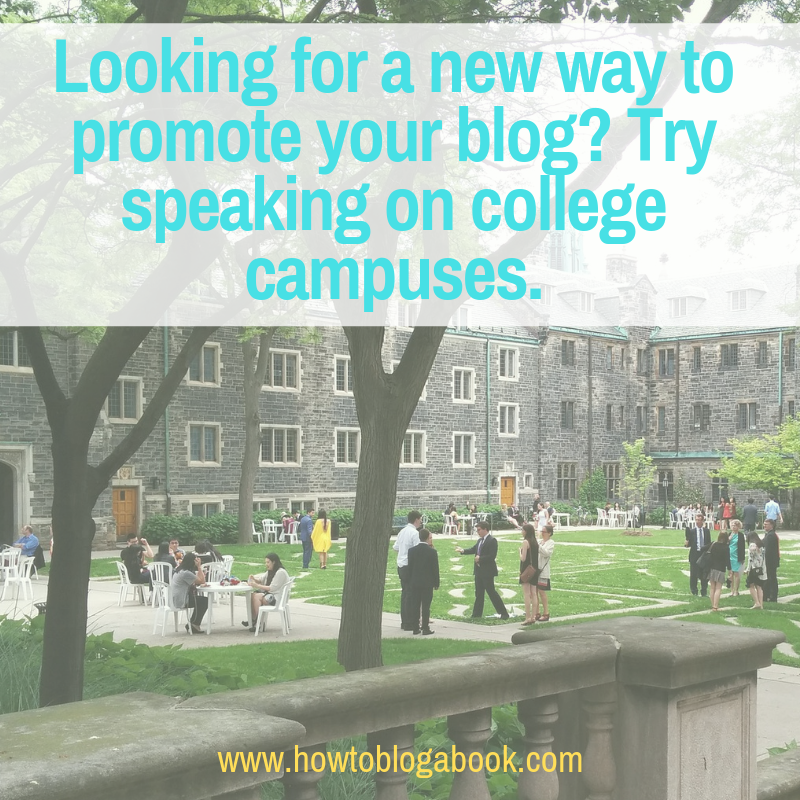College campuses are a great place to learn, have fun…and promote your blog. College is a time to learn more about the world and yourself, and most college students use blogs to help them do just that.
Blogs are an excellent way for a busy student to explore a new interest. Not only are young adults reading blogs about everything from whales to politics to meditation, but they also are writing them. Student written blogs aren’t all about college life; they are as varied as the students themselves. So, introduce students to the book you’re blogging by stopping by campus.
This type of blog promotion serves two purposes. First, it can help you gain readers, which is a valuable writing tool. The reaction of your readers can help guide and polish your writing and the direction of your book. Second, you will have an audience eager to purchase when your blog eventually becomes a book.
Student Groups on Campus
There is a student group for everything on campus—anime artists, young Republicans, Christian youth, saving endangered animals. Everything! It may take a bit of sleuthing, but chances are you can uncover a group or two interested in the subject of your blog.
Start your research with the school website by looking under student life or the college calendar. You can also contact the director of student life or, if you’re close enough, visit the campus to check out the posters plastered in the halls or attend a campus-wide event. You can learn about groups and meet their leaders when they are recruiting new members at events like homecoming, open house for prospective students, or the beginning of the school year. There also will be multiple groups and publications for journalists and writers that will be interested in hearing from you merely because you are a writer, no matter what topic you write about.
Speaker Plan for Campus Gigs
Some groups are familiar with having guest speakers, but for others, this will be a new experience. When you find a group that would be a match for you, it doesn’t hurt to have a “speaker plan.” It’s easy to determine the where and when for an event, but little details can be easily overlooked. That’s why it helps to provide a list of questions like these:
- Will there be a stage or podium? Or will the room be set up in a more casual seating style? (Size of the audience often determines the most effective type of event.)
- Will this be an event for group members only or open to the public?
- Will this be a free or ticketed event? If tickets are needed, where can people get tickets?
- Will there be a microphone or electronic setup needed for a PowerPoint presentation, etc.?
- Will it be part of a regular weekly/monthly meeting or a separate event?
- How long should the event be?
- Will there be the opportunity to sell books during/after the event? Can books be offered for sale in the campus bookstore before/after the event?
- What format is preferred? Speech? Interview? Audience Q & A? Some combination? If a speech is preferred, be ready to provide a list of possible topics so the leaders can choose the one that would best match the group.
- How will the event be promoted? Campus newspapers, radio stations, bulletin boards, social media? Will the promotion extend to the community beyond the campus?
- What can I do to help with promotion—provide a headshot, bio, event description, participate in an interview before the event for campus or community media outlets?
- Will the event be covered by campus or community media outlets?
Campus Community Outreach
Many campuses make an effort to be friends with their community by organizing events that bring community members onto campus. If they have a Senior College or Community Luncheon Series, that may be a perfect fit for blog promotion. Usually, these programs reach out to the 50+ crowd—one with limited classes or workshops that meet one to three times. These classes are typically offered during the day and are much more casual than an actual class. There are no books, tests or credit hours. In my experience, they are also much more fun than teaching a traditional class because the students are always very eager to learn.
Propose a workshop on blogging your family history, member blogging (for volunteers involved with charitable groups or organizations) or business blogging. Some schools also have lunch and speaker programs for the community with an audience that skews older simply because they are held at lunchtime during the work week. These programs vary widely, so make sure you go over your Speaker Plan with them to see exactly what they want from you. Never forget that a Community Series could be an “audition” for a larger event for the entire campus community.
When you approach local campuses, keep in mind that you may be the first blogger to approach a group leader or event organizer. Convince them that you would be a great fit by being professional, confident that the school would enjoy a relationship with you, and ready for all questions.
And as always…do your homework! Good luck heading back to school.
Have you spoken on campuses about your blog or book? Tell me in a comment below.
About the Author
 Jodi Webb has written advice columns on organization, text for Nintendo DS games, trivia questions for charity fundraisers, and toy and book reviews in addition to annual reports, press releases, and company brochures. She’s written hundreds of articles for magazines such as Birds and Blooms, PTO Today, and The History Magazine. The former blog tour organizer at WOW—Women on Writing, she currently works for a small regional newspaper
Jodi Webb has written advice columns on organization, text for Nintendo DS games, trivia questions for charity fundraisers, and toy and book reviews in addition to annual reports, press releases, and company brochures. She’s written hundreds of articles for magazines such as Birds and Blooms, PTO Today, and The History Magazine. The former blog tour organizer at WOW—Women on Writing, she currently works for a small regional newspaper
Image copyrigh: jessie_zy86 / Pixabay.com


Hey Jodi! This is very interesting and insightful. Thank you for sharing.
Hey Jodi, You are really an awesome content writer. Thanks for bringing this post.
Best Regards
Sweety 🙂
Thanks for this valuable knowledge.I loved this. keep sharing. to know more about click <ahref=”https://www.digitalgurusanjog.com/2021/05/20/future-of-blogging/”>future of blogging